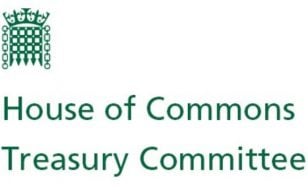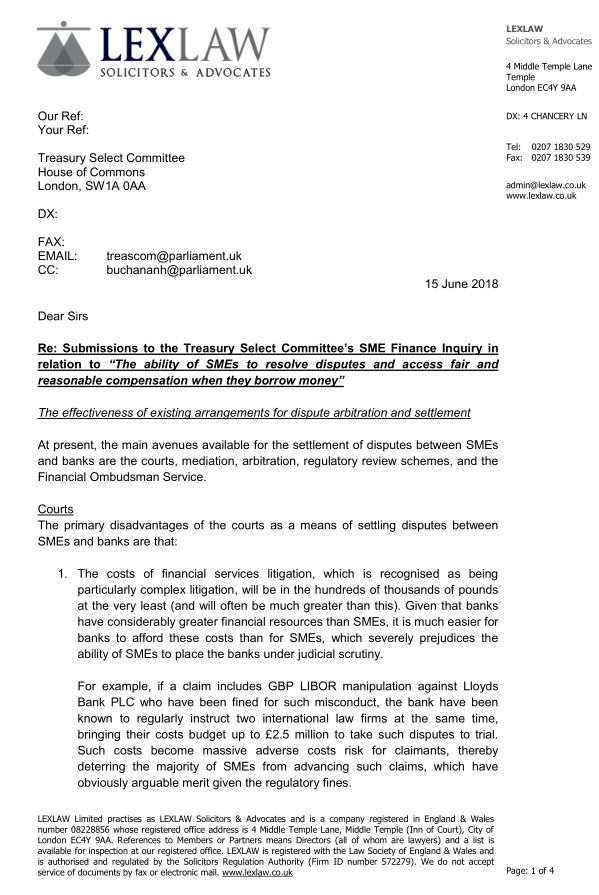We have today submitted evidence on the ineffectiveness of existing arrangements for dispute arbitration and settlement between SMEs and banks to the Treasury Committee‘s SME Finance Inquiry.
The effectiveness of existing arrangements for dispute arbitration and settlement
At present, the main avenues available for the settlement of disputes between SMEs and banks are the courts, mediation, arbitration, regulatory review schemes, and the Financial Ombudsman Service.
Courts
The primary disadvantages of the courts as a means of settling disputes between SMEs and banks are that:
1. The costs of financial services litigation, which is recognised as being particularly complex litigation, will be in the hundreds of thousands of pounds at the very least (and will often be much greater than this). Given that banks have considerably greater financial resources than SMEs, it is much easier for banks to afford these costs than for SMEs, which severely prejudices the ability of SMEs to place the banks under judicial scrutiny.
For example, if a claim includes GBP LIBOR manipulation against Lloyds Bank PLC who have been fined for such misconduct, the bank have been known to regularly instruct two international law firms at the same time, bringing their costs budget up to £2.5 million to take such disputes to trial. Such costs become massive adverse costs risk for claimants, thereby deterring the majority of SMEs from advancing such claims, which have obviously arguable merit given the regulatory fines.
2. Litigation is frequently a time-consuming process, as it often takes at least two years (and frequently longer) for cases to reach the trial stage. This level of delay exacerbates the aforementioned costs disadvantage faced by SME claimants and consequently makes it easier for banks (with their greater financial resources) to use increasing legal costs and adverse costs risks as leverage against SMEs in order to minimise any financial redress paid out to the wronged SMEs.
3. Banks are able to shape the case law in financial services litigation to their advantage via a process of “unnatural selection”, which operates as follows:
a. Banks use their greater financial resources and the burden of substantial legal costs to pressure smaller SMEs into giving up their legal claims, thereby leaving only the larger SMEs able to afford to go to trial (and, even then, with some difficulty).
b. At trial, the courts are more likely to decide that larger SMEs have similar commercial bargaining power as banks and, on that basis, set legal precedent that banks owe greatly limited duties (if any) to their customers.
c. Banks then use the accretion of case law favourable to them (together with their greater financial resources) to pressure smaller SMEs into giving up their legal claims, and so the cycle continues. This ultimately creates a barrier that hinders SMEs from seeking redress against banks through the courts.
Mediation
While mediation has the advantages of being confidential and relatively inexpensive, its effectiveness is hindered by its voluntary nature, which means that banks with large financial resources can simply refuse to mediate as part of a deliberate strategy to strengthen their own negotiating position and “starve out” SMEs. Furthermore, mediation usually takes place during litigation (rather than before litigation is commenced), and therefore the costs saving involved with mediation is limited.
Arbitration
Like mediation, arbitration is a confidential and voluntary process, but the effectiveness of arbitration as a form of dispute resolution is limited because the rules by which arbitrations are conducted are not widely known or understood (unlike the Civil Procedure Rules that govern civil litigation) and there are limited opportunities to appeal or challenge any wrongly determined cases.
Regulatory review schemes
Regulatory review schemes, the most prominent example of which is the review of past sales of interest rate hedging products by banks to SMEs, should involve the regulator (i.e. the Financial Conduct Authority).
However, in reality, the FCA abdicates its regulatory responsibilities in these review schemes – for example, in the aforementioned IRHP review, the FCA “agreed with the banks that they [i.e. the banks] will review all sales of IRHPs”. It was both unfortunate and surprising that the FCA believed that the best party to investigate the banks’ wrongdoing was the banks themselves, and this mistake is being repeated in the review of the activities of RBS’s Global Restructuring Group that was announced in November 2016, which RBS is conducting itself.
In addition to the inherent conflict of interest in allowing wrongdoing banks to adjudicate claims themselves, which incentivises banks to reduce the amount of financial redress offered to wronged SMEs, regulatory review schemes are beset by other significant problems, including the substantial delays involved. The IRHP review, for example, was announced on 29 June 2012 but took several years to complete, which meant that many SMEs’ legal claims were time-barred and therefore incapable of being pursued in the courts. Further, due to the one-sided conduct of such review schemes, as the banks are the only party to see all of the information involved, SMEs are prevented from understanding the full force of the wrongdoing against them (which is the first step to holding banks to account).
Financial Ombudsman Service
The Financial Ombudsman Service is of limited utility to SMEs attempting to settle disputes with banks because it is only able to deal with cases for losses of up to £150,000 and does not either punish wrongdoer banks or monitor banks to ensure that they comply with the applicable rules and regulations. Further, a large number of SMEs do not qualify as micro-enterprises and the banks are adept at raising technical arguments on jurisdiction to prevent the FOS from acting.
By way of example, we have seen a recent case where the FOS accepted a complaint for an SME assessed as a micro-enterprise and then reached a provisional decision against Lloyds Bank PLC, awarding over £100,000 for the mis-selling of a fixed rate loan. However, Lloyds then argued (belatedly) that the FOS should not adjudicate the dispute as the complainant was allegedly not a micro-enterprise and therefore not eligible to bring a complaint. Remarkably, the FOS seems set to accept this as a basis not to reach a final decision, demonstrating the skill and persistence with which banks and their legal teams seek to elude any regulatory accountability for their actions.
The merits of the Financial Conduct Authority’s proposals for expanding SME access to the Financial Ombudsman Service
While the FCA’s proposals are welcome, particularly in relation to the extension of the rights of larger SMEs, charities and trusts, they do not go far enough in rectifying the existing flaws in the limited role and ambit of the FOS, which is an organisation set up to deal only with simple customer complaints rather than anything of a complex nature. In addition, the FOS deals with cases on a one by one basis and does not set precedents for other cases and in so doing does not create any proper impetus for change in conduct.
The case for establishing a new tribunal body for settling SME banking disputes and the means by which such a body could be created
It is clear that SMEs are too often drawn into complex disputes with banks and other financial institutions, which disputes are beyond the remit of the FOS to address due to FOS’s maximum threshold of £150,000. Furthermore, the court system is costly and risky for SMEs (who do not have the financial and legal sophistication of the banks). The FCA is a regulator and is neither mandated nor equipped to be an arbiter of disputes. Moreover, regulatory review schemes are fatally undermined by the reliance placed by the FCA on the wrongdoer banks to conduct such review schemes (premised on the inherently unjust and flawed self-determined compensation flaw).
It is clear that the current avenues for redress are not working for SMEs; if justice is to be delivered and standards of banking conduct to be corrected and then maintained at fair levels in the future, a new avenue for redress needs to be created.
A Financial Services Tribunal would offer a permanent independent commercial dispute resolution platform and, modelled on the Employment Tribunal, can be subsumed within the current framework of the Tribunals, Courts and Enforcement Act 2007. Such a tribunal would be able to exercise appropriate judicial control over the financial services industry where a lacuna currently exists in practice for SMEs. The tribunal would fill the redress vacuum that SMEs are often trapped in, where their disputes involve sums over the FOS’s compensation limit but where High Court litigation is too costly.
A Financial Services Tribunal would serve to restore faith in the banking sector by providing a platform for justice for SME customers and instill confidence in the banking sector by operating as a safeguard that the prospect of public censure would deter future financial misconduct.

